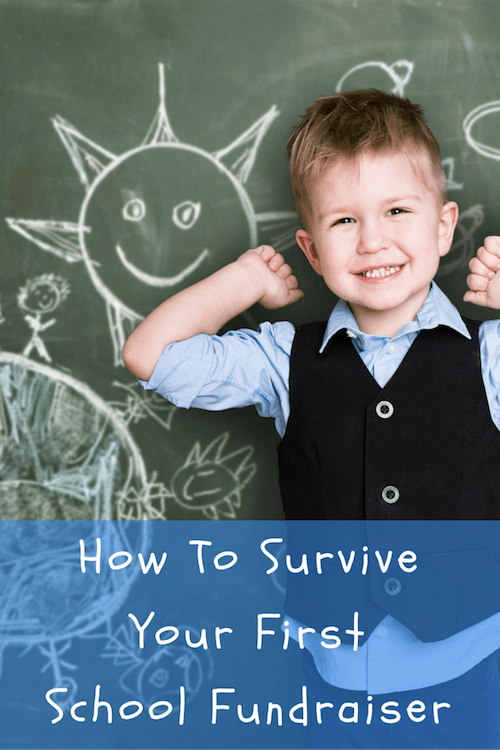Educating our children is expensive, so schools – no matter…
How to Survive Your First School Fundraiser

Raising funds is never easy. If it were, people wouldn’t have to put so much time, thought and energy into coming up with good ideas for it and every school, charity or church would always have plenty of money for all of their needs.
Putting on a school fundraiser is often even more challenging because of the relentless year-in and year-out nature of it and because the cast of available volunteers is always shifting and changing as students graduate and parents drift on to other schools, other concerns.
Despite being the bedrock of our society, schools always seem to struggle for the money and resources they need.

Even though schools are one of the primary ways – and in some cases, are the primary way – that our children are shaped and moulded into the adults who will someday run the world, we continue to treat both our public and private schools as if they ought to be able to function on the goodwill and best intentions of teachers and administrators instead of cold hard cash, like the rest of the world.
So how do you survive? How do you make it happen?
Before taking the leap and making a decision about how to raise funds, there are three key survival skills you must know:
- Know your most important stakeholders
- Know the psychology of your donors
- Know how to develop a master plan
Let’s look into this in detail below. Meanwhile, if you’re after fundraising ideas, check out this article on how to super charge your school fundraising.
1. Know your most important stakeholders
The secret to surviving your first school fundraiser is a resource that’s much more permanent and reliable than the students or their parents. The secret is simple, but powerful: It’s the teachers at the school.
Firstly, teachers often have the most vested interests in ensuring your fundraising activity works as the money collected often means the difference between being able to provide the programs and education they want to the children and being forced to make do with less.
Secondly, teachers tend to work at the school for years, even decades. This means they not only have a lot of experience and wisdom regarding activities that have worked in the past (or didn’t work), but have a lot of experience on the less exciting organisational and logistical side of things as well.
But the main thing the teachers at your school offer to your campaign is talent.
Teachers come from a wide variety of backgrounds, from science to literature to health and fitness. Use that!
Adults are always excited about affordable continuing education. How about an adult cooking class from the Home Economics teacher, a personal training class from the Gym teacher, a movie night/film studies lecture from the Film & TV teacher.

EXCITING IDEA: How about an adult cooking class from the Home Economics teacher?
It doesn’t necessarily have to be specific to their subject matter. Teachers have hidden talents, too!
Finally, the teachers at your school have likely worked together for some time. They’ve helped each other with lesson plans, with student management and every other aspect of their professional lives – that means they’re already an effective team.
Use that too! A well-oiled team can leap into action to get things organised and do the necessary work without delay or confusion. Your teachers are already used to getting things done as a team, so using them to get your activity off the ground is a no-brainer.
After all, everyone who’s part of the school community has a vested interest in making the activity as successful as possible. Second to the kids of course, noone benefits more directly from expanded funds than the teachers themselves.
2. Know the psychology of your donors
The best way to improve your school’s fundraising performance is to understand the psychology of donating and design your efforts to combat the negatives.
Many people, when working up a plan, try to overwhelm donors with numbers in order to paint a picture of the problem. They come up with stats about how many kids won’t be able to do this; how many kids won’t be given these tools or materials; or how many children will miss out if a specific program isn’t funded.
The problem? Studies show that people give much more when there is a single focus for the donation – a single student in need.

BE EMOTIVE: Rather than bombarding people with numbers, use a case study about a child in need.
This is primarily because people don’t like to waste time or money. If you tell them that 500 students need help, they feel their small donation isn’t enough to make a difference and are reluctant to waste it.
If you give them a single student who will benefit, they’re more generous and likely to give, because they can imagine their donation really achieving something.
That doesn’t mean the funds go directly to that child. It simply means using a case study – and emotive story to tell – rather than bombarding people with numbers.
Additionally, the easier you can make donating, the more donations you’ll get.
Donating to your cause shouldn’t, ideally, involve more than one step because more than one step instantly doubles the chances your donor will walk away or give up.
3. Know how to develop a master plan
Even though many people support their local schools and give money willingly for them, most people involved in school fundraising activities know that some years are better than others and some ideas are more successful.
In fact, the greatest challenge to most school fundraising isn’t finding willing donors or even coming up with creative and effective ideas. It’s a lack of planning that results in a chaotic, uncoordinated year.
We’re not talking about the individual planning that goes into each specific fundraising idea. Those can be perfectly planned and meticulously managed and still mysteriously have limp or disappointing returns on what seemed like sure-fire success.
What we’re talking about is a lack of a master plan.
A master fundraising plan would cover:
- All events and campaigns to be run each year, with each one tied to a specific goal or budget (e.g., a sausage sizzle to raise money for a Year 12 trip, a cake sale for new sports equipment, etc.).
- A calendar with all events plotted out so everyone involved can see at a glance which competing events are very close together.
- Clear goals based on previous bests and worsts from past fundraising campaigns.
For people used to ‘winging it’ when it comes to school fundraising, the master plan can seem overly fussy. The fact is, it gives you planning superpowers and can be used in a variety of ways to improve your fundraising efforts:
- The calendar can show what events or campaigns could be combined. Events that occur just a few days or weeks apart can wear out parents, teachers, students, sponsors and donors. Combining them into one can actually raise more money than two separate events.
- Clear goals and histories show you what’s worked and what hasn’t in the past. Phasing out ideas that seem great but never perform and emphasising ideas that always do well will slowly build up the amounts you raise.
- Increased coordination – if you have a lot of people who have taken ownership of certain fundraisers or annual events, circulating a master plan will help them to keep the overall goals in mind and work with each other instead of treating each other like rivals.
If nothing else, a master plan forces everyone to see the big picture. It will have a dramatic effect on the morale and spirit of your team because they will see clearly what they’re trying to accomplish.

SECRET TO SUCCESS: A master plan helps everyone see the big picture.
Raising funds for a school is a worthy project and a huge benefit not just to the students in attendance, but to future students who will benefit from new programs and equipment as well as your community as a whole. The better educated a generation is, the better off the community is over time.
Your first school fundraiser is definitely worth surviving, don’t you think?

